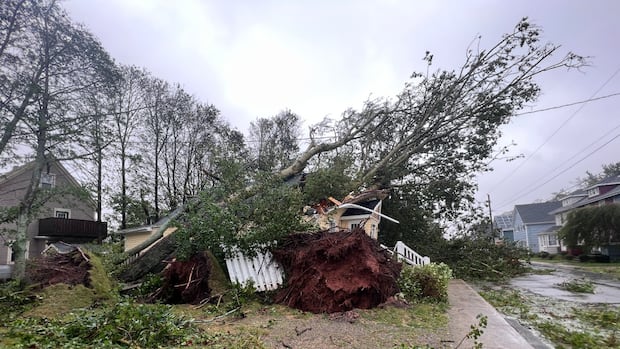PEIThe former head of the Canadian Hurricane Centre is concerned about the impact recent cuts to the organization’s American counterpart will have on storm forecasting here at home.’Forecasting has come to where it is now… because of the investments in research’Marilee Devries · CBC News · Posted: Aug 21, 2025 10:04 AM EDT | Last Updated: 3 hours agoJim Abraham, former head of the Canadian Hurricane Centre, has concerns about the future of storm forecasting research after recent cuts impacting the National Hurricane Center in the U.S. (Shaina Luck/CBC)The former head of the Canadian Hurricane Centre is concerned about the impact recent cuts to the organization’s American counterpart will have on storm forecasting here at home.Earlier this year, the U.S. government cut thousands of jobs from the National Hurricane Center’s parent agency, the National Oceanic and Atmospheric Administration, raising the questions about ripple effects in Canada.The NHC has always worked closely with its Canadian counterpart to track hurricanes and come up with the most accurate forecasting.Jim Abraham, who worked for Environment Canada for 36 years and was the Canadian Hurricane Centre’s first director, said he’s worried about cuts to forecasting research in the United States. WATCH | Why Trump’s cuts could make hurricane season more dangerous:Why Trump’s cuts could make hurricane season more dangerousThe U.S. National Oceanic and Atmospheric Administration is preparing for an above-average hurricane season, with almost 2,000 fewer staff than last year. For The National, CBC’s Katie Nicholson goes to Florida, where forecasters say that cuts by the Trump administration are a threat to safety.”Hurricane forecasting has come to where it is now, the skill and the ability to forecast quite accurately, because of the investments in research,” Abraham told CBC News, adding that the NHC and Canadian Hurricane Centre have had a close relationship for decades. “During each storm there’s co-ordination calls that take place so that the forecasters can understand what some of the challenges are and to agree on what the best track will be on the storm that’s going to impact Canada or our offshore waters.”Despite the cuts south of the border, Abraham said he’s confident the relationship between the two centres remains strong, and that the NHC is finding ways to mitigate the loss of staff and data collection. “In the short term, there will be efforts made to ensure that the impacts are negligible.”He added that all countries work together to share research within the World Meteorological Organization.’Weather does not respect borders’Environment and Climate Change Canada, the federal agency that’s responsible for the Canadian Hurricane Centre, told CBC News in a statement that the centre has other national meteorological bodies it can work with when it comes to sharing research.Those include the United Kingdom Meteorological Office, MeteoFrance, the European Organisation for the Exploitation of Meteorological Satellites and the World Meteorological Organization.”Nation members of the WMO routinely share weather data as weather does not respect borders,” Environment Canada said in the statement. “ECCC has developed plans to minimize any potential impact of data transmission changes from the United States.”The National Hurricane Center says Hurricane Erin has weakened to a Category 2 storm and is unlikely to make landfall on the east coast of the U.S. (NOAA)The weather agency is predicting above-normal hurricane activity this year, with 13 to 19 named storms, six to 10 hurricanes and three to five major hurricanes in the Atlantic Ocean basin. Hurricane Erin has weakened to a Category 2 storm as it moves toward eastern Canada, according to the NHC.The organization said the storm is unlikely to make landfall on the U.S. east coast as it veers northwest, further out into the Atlantic Ocean. ABOUT THE AUTHORMarilee Devries is a journalist with CBC P.E.I. She has a journalism degree from Toronto Metropolitan University. She can be reached at marilee.devries@cbc.caWith files from Jackie Sharkey
Expert worries cuts to hurricane research in U.S. might cloud forecasting in Canada











